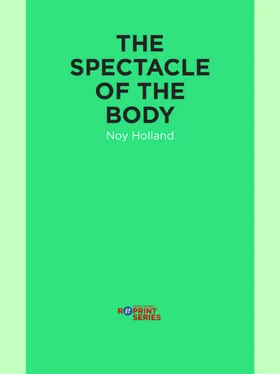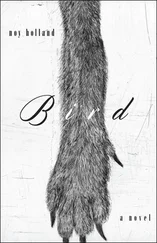“Do you think I’m pretty, Orbit?”
“Yes and no. Sure,” I say.
“I think we better go,” I say.
“Oh, shut up, Orbit. You could hang yourself at the foot of her bed and Mother wouldn’t think twice of it.”
Cissie has a beaded purse and in the purse a plastic bottle. She unscrews the top from the bottle and puts the bottle in my hand.
“Try some of this,” she says. “It’s good for scrapes and bruises.”
It is as blue as the lean-to’s blue, bluer than a sea blue sea I have not swum in.
“What’s it for, Cissie?”
“To make you want nothing. More of it — you want that. But otherwise nothing.”
“But why should I want nothing?”
“Oh, never mind, Orbit.”
So I take a big sip from it, another sip like Cissie says.
She says to lie here. We have to lie here. The kingfishers, if we are still, will steal our hair to knit the bones to nest upon the water.
Today is not a wind at all even on the water. I know today our lake is bright, so you can see your shadow gone to pieces in the water. Still is ever you swim, your shadow swims with you.
Once a bright leaf falls. Once I saw a silver fish trail me in the water. Even if I swam hard, even if I did not quit, when I quit, I saw the fish beneath me silvering my shadow gone to pieces in the water.
The fish was as quick as my tongue. It was small enough to swallow — small enough to swim inside my mouth if I had let it.
I wish I had let it.
Momma says that, in her mouth, spiders have spun a web and webbed her toes and fingers.
Maybe you also feel it. If it is bright, you see a shadow, even if your eyes are closed, fall across your face. But I think you can feel it. I feel Cissie’s shadow, I think, fall across my face. Then I feel Cissie’s heart start to pound against my face.
“Open your mouth, Orbit.”
In Moon Lake, the catfish grow as big as boys and dogs.
The lake was once a bend in the road.
There is a lake nearby where our father grew up that goes by the name of Reelfoot. Beneath it is a fault called New Madrid, the stress falling on the first syllable, the open a , the plea: New Ma drid. For days, at the time if the earthquake that formed the lake, the waters of the Mississippi ran backward.
Let me say I stood in our stand of corn, seeing the wind move the drapes out past Mother’s window. I heard them; they have those little weights in them that beat a slow, tapping sort of sound against the clapboard. When the wind stopped, the drapes hung flat against our house.
It got to be needles.
She was begging me for it. The morphine we had, the bottle the doctors had given us, was enough to kill off the whole house of us, and the swaybacked mare, too. Mother ranted to get up out of her bed to get up into the closet to it where she had seen me keep it.
I gave her enough to sleep through it, is all, so she would quit begging me for it.
That was all.
It got to be she quit begging me for it, quit begging or sleeping or eating at all, or wanting at all like she used to want to have something cleaned or moved in the room like she used to want, or to be touched. Other lies there, like she’s like now, lying flat the way Mother does now.
I said, “Hold still. You lie here, Orbit.”
I held him.
I could see the way we took, the curved mounds the gown had left when we lifted the flounce in the dust and leaves.
I said, “Now we have a secret. Now you know what I am glad of most: that Mother doesn’t speak my name.”
When I have raked the glass and nails across our road at night, when I have washed our momma’s feet and filled the trough where the tadpoles swim and mended with the cast-off hangers Cissie strew beneath the pin oak tree the broken place in the wire fence the wiry coats of the dogs snag on, I ask her.
“Can’t we go now?” I ask her. “Haven’t I stayed?
Cissie is with the rabbits down squatting in the yellow dirt. She has dirty knees.
“You know we can’t,” she says. “What about your mother? We can’t just pick up and waltz off to the fair.”
But I say, “Cissie.”
I had not meant Cissie —not thought of her, that she would go.
I say, “I thought me and Bingo might could go down to the fair.”
Tonight is just the slough to cross, the stubbled stretch of dusty field I bent my spokes and, days ago, punctured both my tires on. Now is no thrum nor rattle, no swoop I keep my breathing from.
I go by foot, by flattened path. I leave my bike in the garden.
I take my pail, my hollow pole, my chicken necks and fishy eggs the whiskered fish are wise to. The list Cissie makes of things to buy, I take — but I leave Bingo.
There is no sign of Bingo.
At the lake is a new moon, shining. It is best on a night when the moon is thin to lie alone in your metal skiff to listen for your skiff to tick and slur with the swim of the snakes’ thick bodies. They are in the deep part you dove into with stones to ride, or some times, by skinny chance, you find them in the shallows. I pole out from the shallows — past pale frogs squat in the laps of trees I since have grown and done with. Such frogs — some harmless, yippy, simple-sighted house-gyp’s easy prey.
It is a hard row open-handed out to reach the deeper water, a clever eye that catches sight, by thin moon, of their mouths. It is the best a boy can hope to see is inside their mouths. Else there is a place to look where you can see the water welt, which you have got to watch for.
Then you have got to lie down.
You have got to listen.
Listen: I know it is cold down there at night against the water.
Because also, it is August. Also I was dressing, thinking only of the haze of heat that lies on us in August. Still I wait here; you have to wait here. Maybe there is fog here, the thin moon down.
I don’t think they hear me.
I have got my chicken neck poked onto my hook I strung from my pole our daddy gave me. Maybe they can smell it. They smell with their tongues.
Do you know there is a good chance that tadpoles see a simpler world than we humans do?
We can see their legs inside them, their pinpricks behind their toes of their tiny ears. Their ears are not like ours.
A boy can hear the frogs.
But frogs only hear frogs I hear.
The frogs cannot hear Momma. The frogs cannot hear Cissie out singing in the wind at night to lost dogs if they come.
But maybe they won’t come. Maybe since I fixed the fence, then it will be just snakes tonight to come into the garden, and garden snakes are garden snakes. They are not like water snakes, which rob the nests the kingbirds make if ever there are calm days and no wind on the water.
Now is not a wind at all to move you on the water.
Do you know where the Pacific is? Because there is a frog I heard of there which lives in some island there which I would like to look at.
It is not like our frogs here. It is very rare, I hear. But I would like to look at it.
I can see the water welt starboard past my metal skiff I Kneel up in to paddle. So I cast out, I think to cast out. I have my stone to stone them with if I miss my pail. I have my pail, my good stout lid on it, which Daddy says you have to have if you are ever going to make a nickel at the fair.
But first you have to cast out.
Come on, Orbit.
I bet some egg-sucking snake lives there, where the frogs live out on that island there, and that is why they do it — the little ones.
They are not like our frogs.
They are not like turtles. Their eggs are not thin egg’s like Doll’s that she leaves out by the road some night for snake maybe to find some night while we are in the garden.
And they are not like tadpoles. They do not swim. Their legs grow up outside of them, growing in their mother’s back — her back as smooth as Doll’s smooth back they squat on until the weight of them pocks themselves a place in her that she will have to carry.
Читать дальше











